- The Appalachian Spirit: 49 Winchester at Two Step Inn Festival 2024
- Wyatt Flores at Two Step Inn: Photos and Review
- Legendary Neal McCoy at Two Step Inn: Review and Photos
- Mark Chesnutt at Two Step Inn: Photos and Review
- Rising Star Sadie Bass Shines at the Faster Horses Festival
- Sawyer Brown at Faster Horses: A High-Octane Celebration of Four Decades
Making Rumours with Ken Caillat
#FleetwoodMac MAKING RUMOURS
Twelve days after he first heard of Fleetwood Mac, Ken Caillat was driving from LA to the Record Plant in Sausalito to engineer and eventually co-produce what would become one of the top selling albums of all time. Twelve months later, the work on Rumours would finally be done, and as Ken wrote in his book, Making Rumours, “We weren’t just fifteen-minute famous… but forever famous.”
In a time before MTV, before personal computers, cell phones, and even before answering machines, the band, Caillat, his co-producer Richard Dashut, and a loyal group of technicians, basically cocooned themselves away from the party lights, the distractions, friends, and family to immerse themselves in the business of making a follow-up album to what was known as Fleetwood Mac’s White album. The White album of course, introduced Lindsey Buckingham and Stevie Nicks to the world stage, forever changing the veteran blues band to a rock phenomenon. The true achievement of creating Rumours was realized when it won the Grammy in 1978 for Album of the Year, and went on to sell over 40 million copies.
A recent Life Magazine retrospect on the forty years of Fleetwood Mac called Rumours a “sonic tsunami,” and “unavoidable.” And it was.
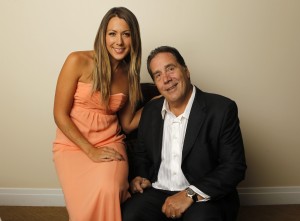 Ken Caillat went on to work with Fleetwood Mac on Tusk, Mirage, and Live, then moved on to working with artists such as Michael Jackson, the London Symphony Orchestra, Christine McVie, Warren Zevon, and his daughter, Grammy winning artist Colbie Caillat. Their collaborations have produced a second #1 album for Ken, in Colbie’s Breakthrough. Ken is also involved in ArtistMax, which hosts workshop sessions and seminars where creative artists are offered guidance from industry pros, on every part of the music business.
Ken Caillat went on to work with Fleetwood Mac on Tusk, Mirage, and Live, then moved on to working with artists such as Michael Jackson, the London Symphony Orchestra, Christine McVie, Warren Zevon, and his daughter, Grammy winning artist Colbie Caillat. Their collaborations have produced a second #1 album for Ken, in Colbie’s Breakthrough. Ken is also involved in ArtistMax, which hosts workshop sessions and seminars where creative artists are offered guidance from industry pros, on every part of the music business.
Recently, I had the opportunity to speak with Ken about his experience making the album and writing his book “Making Rumours,” as well as the Life Magazine Fleetwood Mac retrospective.
Kath Galasso: Before I ask you a few questions about the book, let’s talk about your dissatisfaction with the Life Magazine special edition on Fleetwood Mac where your book was heavily referenced and for which you were interviewed.
Having read your book and the Life magazine, the first thing that I noticed was the lack of information about your co-producer, Richard Dashut. In your book, Richard is constantly referenced as an invaluable part in the making of Rumours, and at one point you called him “one of the kindest, most empathetic souls I’ve ever met,” but he was virtually ignored in this publication. Is that one of the things that bothered you?
Ken Caillat: Yeah, I was really upset about that, in fact he was too. He sent me a text and he said “really Ken?” like ‘how dare I?’ And I hadn’t read the article and people were calling me saying “Richard is really mad at you, you should call and apologize.” And I was like “Apologize for what? What did I do?” It was bad, and he seemed to be left out of obvious things and I don’t know why the people did it. I’ve talked to him since and he understands. But the thing that really irked me about the article was they took a lot of my book and quoted it without giving me credit. It sounds like it’s the writers’ story about all the songs and what they were about, when all that stuff is right out of my book. And the quotes that he did from the interview with me, almost every one of them he seemed to make a negative slam on somebody in the band.
They took the best and used it as his (J.I. Baker) and took mine and somehow made it sound like I was hateful of the band. And I remember in the interview he would say “Well what pisses you off the most about Stevie, or was there ever a time that made you mad ?” By the end of the interview, I felt like, in fact I called them back and said “Look I feel that this interview kind of went more negative than I’m used to doing and please don’t do that.” I guess he’s a good interviewer because he got me.
The personal saga within the band is well documented but the magazine seemed to focus more on the personal relationships than on the musical legacy that was forty years in the making. In fact, the chapter dealing with Rumours begins with a primer on the dating status of each member, even bringing in Lindsey’s alleged abuse of a woman he would only meet months after the recording began. It seemed a salacious way to begin talking about such a record-breaking album.
And they hardly did anything about Tusk or Mirage, and they could have really gotten into a lot of meat cause that’s where everybody was really in full drug use and alcohol use. They left Richard out, they kind of twisted Bob Welch’s position cause Wendy Welch called me and said “You’ve got to do something about it.” And I said, “Well, I’ve already talked to a lawyer and I can’t sue them.” But I’ve already apologized to the band on Twitter and Facebook. Bob (Welch) was integral to the band. He was a great guy; I really liked him. He was one of the stepping stones of Fleetwood Mac’s road. He brought in the American side of music; it opened the door for them to go to Stevie and Lindsey. Bob was a wonderful guy and I don’t know how you could say anything bad about him.
There is a Herb Worthington photo used in the book and magazine where Lindsey is sitting on the floor of an airport playing guitar. In quoting your book you say “this type of youthful anonymity would soon be gone,” which to me is a whole different interpretation than what is quoted in the magazine “That guy’s gone.” Was that your actual response?
Yeah, I think so. I mean me too. I used to sit down and play my guitar while I was waiting for a plane. That guy’s gone, right? You’re never going to see me doing that again. And that’s all I meant. At a point, even though you want to, you know you can’t. So I would say it’s accurate but I meant exactly what’s in the book. Everything just changes. This is what I was trying to get at, what I saw and what I felt so fortunate about was my timing with the band, is where I saw them at their innocence. They were like a moth, morphing into the butterfly.
 Let’s talk a bit about the book, Making Rumours. In the preface you write: “It is also the story of a perfect album, made out of flaws in the human spirit, sometimes through agonizing determination, love, lust, and a force of will that made failure unthinkable.” In hindsight, it is all that, but could you feel any of that in the moment?
Let’s talk a bit about the book, Making Rumours. In the preface you write: “It is also the story of a perfect album, made out of flaws in the human spirit, sometimes through agonizing determination, love, lust, and a force of will that made failure unthinkable.” In hindsight, it is all that, but could you feel any of that in the moment?
Yeah, like if we didn’t get what we wanted that day, I’d be “let’s work another hour.” And that’s literally what it was. I think we were all being perfectionists. We were workaholics and it certainly was no party. As I wrote in the very first part of the book, Stevie said “We all know we’re breaking up, so let’s suck it up and let’s work, let’s be professional, and make this thing happen.”
As a non-musician, I was floored by the fact that most of the songs were written on the fly, not complete and/or rehearsed before they got to the recording studio.
Right. I think that always, always happens the first one you make…you have these songs, you know what you’re going to be doing. That’s what happened on Tusk, everybody came in with a song. But the fact that they did the White album and they probably used about everything they had to make the White album. Then they went on tour to perform the White album, and the next thing you know, it’s time to do another album. So they didn’t have any songs ready because they didn’t have time to write it. But that was really unusual. That almost never happens now.
I’ve always been a lyrics person, but I remember when Rumours came out, everything about it caught my attention. Each song had so many layers, every sound was so crisp, it seemed like no detail was overlooked. What was that process like?
As an engineer, I really want to make a great sounding record. I love engineering; that was my passion. I didn’t want to be a producer. I wanted to be an engineer so much and I loved to make sounds sound tremendous. Actually the band fell in love with me cause they said “Ken’s gonna make me sound brilliant.” Like a make-up artist who can make somebody look pretty even on a bad day. So they were like “Ken, take as much time as you want, make it sound the way you want.” So we would do that with harpsicords and other things. And really it was Lindsey who appreciated that. I credit him because he’s the one who would say, “What about a harpiscord” or “What about a dobro?” We had an arsenal of equipment.
 There is a part in the book where you talk about the running order of the songs. You give credit to Judy Wong (of Mac’s management company) for the song sequence on Rumours, but back then the order was for an album with two sides where each side needed to be about 22 minutes. If it was recorded today for a CD or streaming, can you imagine a different running order?
There is a part in the book where you talk about the running order of the songs. You give credit to Judy Wong (of Mac’s management company) for the song sequence on Rumours, but back then the order was for an album with two sides where each side needed to be about 22 minutes. If it was recorded today for a CD or streaming, can you imagine a different running order?
That’s a really good question, and I would tend to say that I wouldn’t want to change anything because it worked pretty well, but I would have liked to have seen “Silver Springs” get on there. That was one of my favorite productions. That was where it all started to fall apart. The album was balanced precariously; I’ll use that word, that you couldn’t introduce anything else. “Silver Springs” was too long; it pushed one side longer than it could be, so it forced us to move everything around to rebalance it. Then it also put another slow ballad in the sequence. I might move up “I Don’t Want To Know” a little sooner, cause that was kind of young and sparky, but the fact that it wasn’t the greatest song probably was better it was left on the second side. Now with the CDs, I’m still stubborn and set in my ways that I still do a running order. Like somebody’s really going to listen to it from beginning to end. Just for that one person who’s going to listen to it.
Let’s talk for a minute about Tusk. You weren’t thrilled with the direction Lindsey was taking toward what seemed to be the polar opposite of Rumours. Considering all that was going on with the dynamic of the band as Lindsey took over with the new musical direction, was Tusk harder to get through than Rumours was with the relationship issues?
Yes, yes, yes, everything. I really hated that one. At that point I was just as messed up as everybody else. I could record, I had a team of engineers behind me and I could be high, I tried not to be, but Lindsey was just getting ornerier and ornerier. I think I said in the book that he could suck the fun out of a room in two seconds. He’s such a serious guy. In the first few days of Tusk, he came in, he went crazy in the shower he admits, and cut all his hair off with a scissors and without a mirror. And that was basically a statement for him. He was looking for change.
The first day we were working on sound he said “take your time getting the top exactly the way you want it. So I do and it sounds great. Then he says “OK, you ready? Now turn all your knobs 180 degrees.” So I did and it went from sounding incredible to sounding all muffled and whompy. And he said “now let’s record it.” I said I cannot do this album and do my best and then turn the knobs the other way. I said “I can’t listen with your ears; I have to listen with mine.“ So I asked if he wanted this record to go from really bright sounding, what Rumours was, to become sounding all muffled and muted and dark. And he said “Yeah,” so I said “Ok, this record is going to be more dark with more emphasis on the bottom, it will still be sprinkled with cymbals and guitars, but that’s what we’ll do.” And that was the tone of the record.
When you first heard Rumours on the radio, it was played in its entirety, first one side then the other. You were in your car with your dog Scooter and you stopped, listened and soaked it all in. In your book you said “I would have done it all again just to experience that moment.” Tell me about it.
It was completely emotionally special and overwhelming. I mean, here they are raving about this record, and literally we were so tired after we did the record… somebody asked me the last day (to hear it) and we played it back for him and he said “I don’t hear a hit.” We didn’t go “Are you out of your mind, this is a hit, this is a hit” like I would now, we were just so tired that we didn’t know. So getting that validation on the radio, I was a single guy sitting alone with my dog and I just remarked “Wow.” I really just wanted to stand up and shout to anybody “Hey, listen to this.” But it was very special, probably equal to when my daughter was born. I still get choked up thinking about it, that I did it. Probably made me a better man to have completed something that monumental, because up until then, anything that I had done was a two-week session or a week session, not a twelve month session. The camaraderie we all had together, it was so special.
Making Rumours Website
Fleetwood Mac Photos by Larry Philpot
Interview by Kath Galasso @KatsTheory

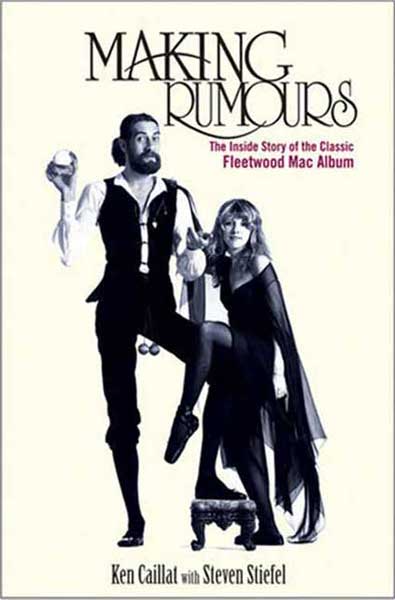
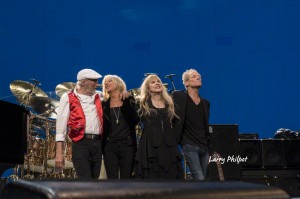
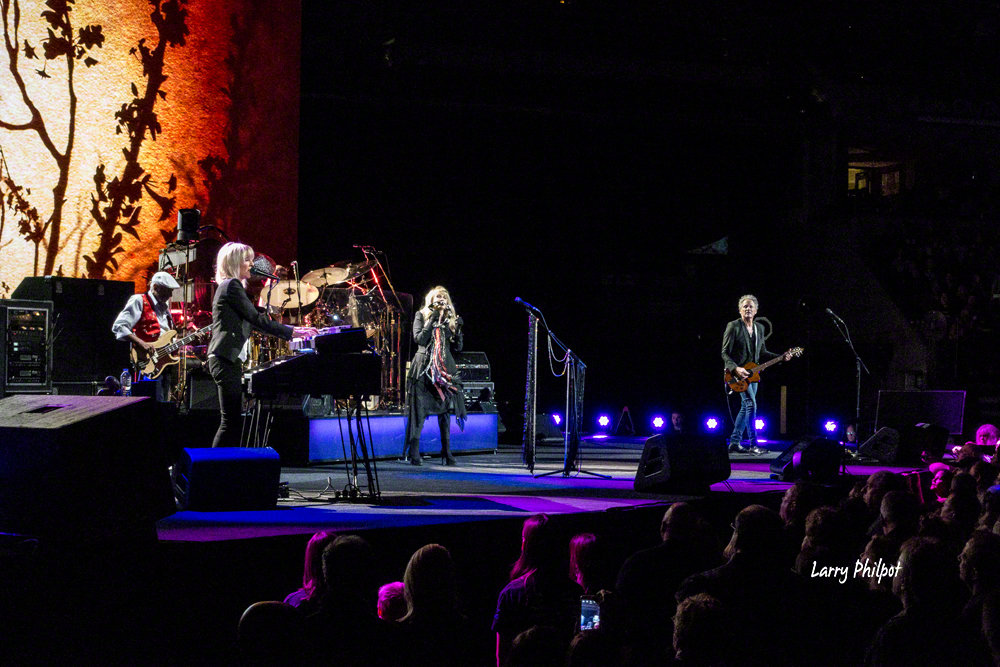
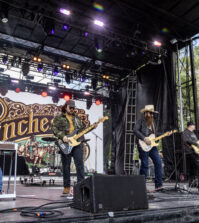

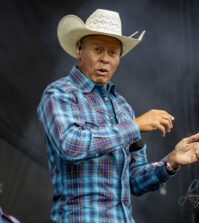
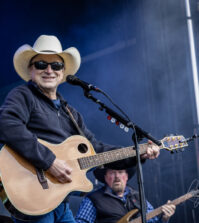


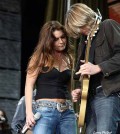
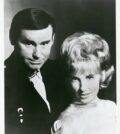
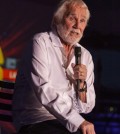

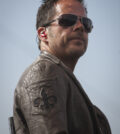





You must be logged in to post a comment Login